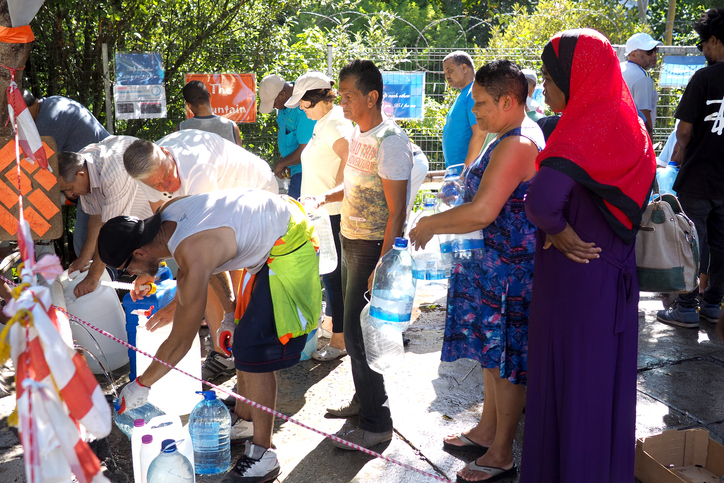In 1751, philosopher David Hume defined the conditions that make justice possible: justice is unnecessary amid great abundance because everyone has what they need and unachievable in times of extreme scarcity because no one can be expected to share when they can barely survive. Justice is the virtue of seeking a fair distribution of goods in a situation where there is enough—but just enough—for all.
The parameters Hume sets for justice could equally be a point about moral psychology. Generosity and growth go together: when resources are abundant, lifting everyone up is an easier sell. Things change when the pie shrinks. If life is precarious and subsistence harder won, then people worry more about their circle of loved ones and less about the larger circumference of humanity.
Imperfect as it is, the past century brought us to Hume’s “Goldilocks Zone” for justice; horrible injustices have occurred, as they have throughout history, but an expanding global economy combined with an expansive moral vision have made human rights and justice for all a viable goal.
As the climate moves from just right to too hot, however, we may see a more inhospitable environment for justice and human rights, as well.
It is not too late to avoid the worst effects of climate change, but the future, if hot, is not looking bright. Rising oceans will likely swamp low-lying nations, and heat will make parts of North Africa uninhabitable. Tropical storms, wildfires, and floods will devastate communities, and the task of rebuilding will burden governments at every level. Climate refugees will strain host communities and governments. Rising temperatures will bring higher levels of violence. Food systems may fail as crops wither, prices rise, and transportation systems break down under the burden of increasing heat, severe weather, and cost. Starvation haunts our future.
We are entering a world of greater scarcity and, even sooner, a greater perception of scarcity.
Under the conditions we are creating, societies and individuals will be under more pressure to survive. Wrenching choices may lead to exhaustion and moral apathy. Suffering will increase for everyone, even if the cost will be dramatically higher for the poor—nations as well as individuals. People will look to governments for help. But a pervasive sense of deprivation and loss may sap our commitment to the needs and rights of others. The rising public burden caused by natural disasters may undermine taxpayers’ commitment to supporting the common good, and common defense, through taxes. Humanitarian needs overseas—in countries that bear the brunt for the excesses of highly industrialized nations—will come up against a sense of scarcity and emergency at home, and potentially opposition to foreign aid in countries that have a moral obligation to provide it. What is justice in the face of extinction?
Public apathy in the face of widespread suffering is only part of the problem that climate change poses for human rights. The summer of 2015 offered an important premonition of what is to come. When Donald Trump announced his candidacy for US president, he garnered press with his extreme attack on immigrants; one month later, a steady stream of people transiting through Hungary, fleeing the conflict in Syria, gave Hungary’s prime minister Viktor Orbán an opportunity to consolidate power using the refugees as a scapegoat. At the time, to me, these developments seemed like a mere prelude to a future where rising heat and sea levels may set off a mass migration worldwide.
Attacks on refugees show how would-be autocrats like Orbán and Trump already exploit a scarcity mindset to undermine human rights. “illiberal democracy” is on the rise, and the human rights edifice built over the past 75 years is crumbling. Roughly a quarter of all nations have enacted “foreign agent laws” punishing donations from abroad, starving rights groups of critical resources. Some foundations have pulled back their support for human rights in response. Groups such as JustLabs report that authoritarians are using sophisticated rhetorical strategies to alienate ordinary citizens from human rights defenders, strategies that tap into the scarcity mindset that I am suggesting will only intensify.
In short, recent years have seen backsliding on our common, global commitment to human rights, and climate change threatens to further erode that support. But the danger is not just from authoritarians or an apathetic, exhausted, and frightened public. Even those of us engaged in struggles for justice are not immune from the psychological impact of perceived scarcity. As resources dwindle and the altruism of those around us is tested, will we maintain solidarity across issue areas? Or will a deprivation mentality splinter cross-sectoral movements as we begin to realize that there will not be enough to go around?
After all, the seams of past fractures are visible in our movements today. There were deep and bitter splits in the last century—between class- and identity-based movements, among different rights claimants, and even between those with similar goals but conflicting strategies. Progressives have done much to overcome divisions and distrust within our movements. Actively reaffirming a common cause between our various movements is essential; stronger bonds now will fray less quickly down the line. Working to shore up support for human rights movements among wider populations will be an even greater challenge.
But, in the end, our rights and our future are inextricable. If our commitment to the universality of human rights breaks, then the result will be a free-for-all; everyone will grab what they can of what remains, and we will all be worse off. If it holds, then we must pursue mitigation aggressively, aiming for the best scenario for everyone among the worsening options we face. Carrying our dedication to universal rights with us into a dimmer future ought to spur us to use our scientific knowledge to create tools—despite the challenges, the uncertainty, and the reasons for despair—that help people thrive in a less hospitable world. That, in turn, will mean a better future for everyone.

